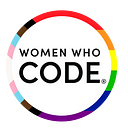A Look Back at the Women Who Code Portland — IoT Hackathon 2018
What do soldering irons, bananas, origami trees, and Red Bull have in common? They were all present at the Women Who Code Portland — IoT Hackathon 2018. Over the weekend of March 23rd-25th, almost 100 developers, designers, project managers, and hardware enthusiasts gathered at Puppet to work on IoT (Internet of Things) projects.
This year’s hackathon theme was Sustainable Futures. Teams used Arduino microcontrollers and Adafruit sensors to tackle problems from monitoring energy usage at large data centers to preventing food waste (which is why one team brought in some aging bananas).
Getting Ready
Thursday
Puppet opened their doors to us on Thursday. Hackathon participants and mentors spent the evening installing relevant drivers, the Arduino IDE, and other software in preparation for the weekend.
Our #WWCode IoT Hackathon Installfest is underway! Hosted by @puppetize! #WWCodeHack18 pic.twitter.com/7R01ez2d9j
— Women Who Code Portland (@WWCodePortland) March 23, 2018
Friday
The hackathon officially kicked off on Friday night. We heard lightning talks from a few of our sponsors, including an introduction to IoT and Android Things Security, a Tamagotchi remake, and a demo of using LoopBack to build an API in under five minutes. Our sponsors also spoke about their companies as well as provided everyone with plenty of great swag.
Sponsors Expo, featuring Portland companies, friendly faces, and great swag.
After all the talks, sixteen teams of four to six people were formed. Some participants came with a group of friends to work with, but if they didn’t, we made them a team of new friends. Each team was given a variety of people with different backgrounds, skills, and skill levels. They spent the rest of the evening brainstorming, white boarding, and planning their projects.
Picking up Momentum
It’s DAY TWO at our #WWCode IoT Hackathon! Attendees are hacking up hardware and pounding @redbull!
Follow along here ➡️ #WWCodeHack18 pic.twitter.com/MpuiMSEuM5
— Women Who Code Portland (@WWCodePortland) March 24, 2018
Throughout the day on Saturday, teams worked on their projects. Some people focused on writing software to read data from their sensors, while others worked with mentors to solder together their projects. Over a dozen programming and IoT mentors helped teams solder and assemble their hardware, as well as troubleshoot and debug their code.
In thirteen hours, teams were able to make serious headway on their projects. There were servos rotating based on how much light different plants in a vertical garden would need, or rotating to close blinds to save energy. There was a makeshift moisture sensor created out of spoons, and a frowny face displayed on an LED screen when near aging bananas. We ended the day at 10pm, so people could go home, relax, and take a well-deserved break from working.
Demo Time
Teams spent Sunday morning finishing up their projects and preparing for presentations. They would present their projects in front of a panel of judges, so they needed to push their code to GitHub and plan a visual presentation like a convincing demo of their hardware. Presentations started after lunch.
Left to right: Alice Goldfuss, Khawaja Shams, Paige Bailey, and Jessica Zhang
The projects were judged on factors like how they related to the Sustainable Futures theme, how well they articulated and addressed a problem statement, and a few other things.
Our esteemed judging panel for the hackathon featured Alice Goldfuss (DevOpsDays PDX), Paige Bailey (Microsoft: Cloud Developer Advocates), Khawaja Shams (AWS Elemental), and Jessica Zhang (Intel).
Winners
Best Design: Shine On
Shine On is an app that directs sunlight within a vertical garden by using a rotating mirror. The team programmed the mirror to shine on a plant for a user-given amount of time, as well as rotated the plant to nourish it from all sides.
2nd Place: PlantiGotchi
PlantiGotchi is an app that monitors the moisture levels in soil and add water when necessary. The team created their own moisture sensor using two spoons, and they used a pump to move water from a cup into the dry soil.
1st Place: Seat Peek
Seat Peek provides a way for the public to know the number of seats available in a public transportation vehicle. They used light sensors on seats to let their app know if seats were open, and made sure to include the status of the priority and accessible seats.
Videos
If you want to relive the magic of our IoT Hackathon, we have a short recap video available below and on our YouTube Channel. Additionally, we recorded all the tech talks from Friday Night as well as the 15 team presentations and demos that took place on Sunday.
Thank you to Aaron Parecki (@aaronpk) of Backpedal Productions (https://backpedal.tv ) for these videos.
Thank Yous
We are so grateful for all the people and companies involved in making this hackathon a success. Thank you to all the participants and mentors for bringing your curiosity, collaborative spirit, and enthusiasm. Thank you to Puppet for sharing their space with us, and especially Eric Putnam, Tiffany Longworth, Eric Sorenson, and Lauren English for their help setting up, working A/V, and spending the weekend with us. Thank you to our Women Who Code volunteers and leadership team for their energy and time. And a thousand sustainable thank yous to our sponsors for supporting our 2018 IoT Hackathon:
Gold sponsors: Intel, Microsoft, AWS Elemental, Airbnb, DevOpsDays PDX
Silver sponsors: Puppet, Alchemy Code Lab, Red Hat
Bronze sponsors: Mozilla, IBM, IOTAS
See you next year!
Part of the WWCode Portland hackathon planning team (Keeley, Caterina, Alia, Richa, Sarah Joy, and Posey) and the judges (Jessica, Paige, Khawaja, and Alice).
Originally published at www.womenwhocode.com.
